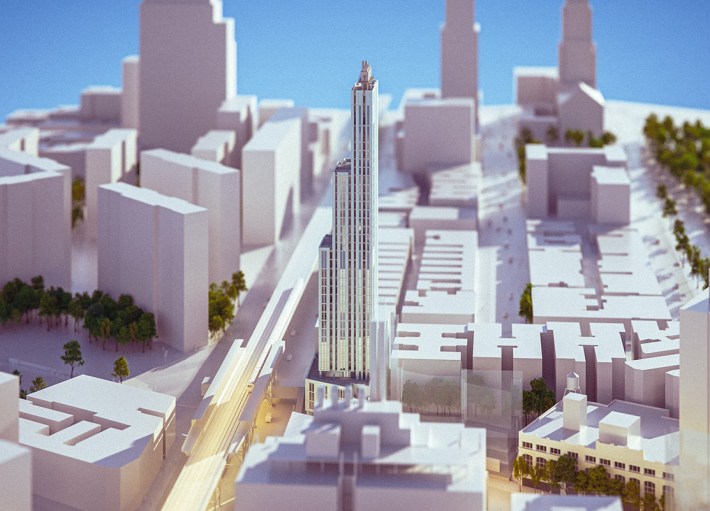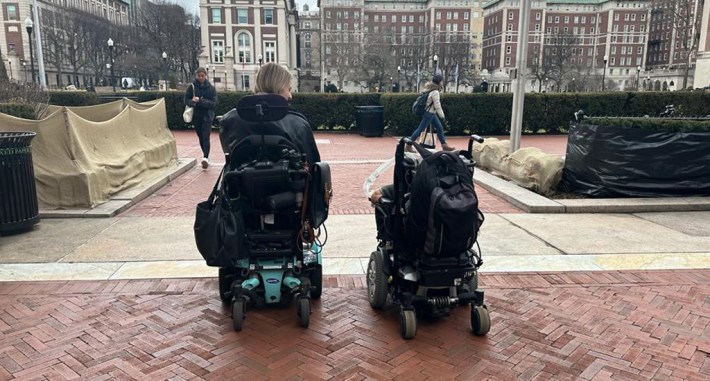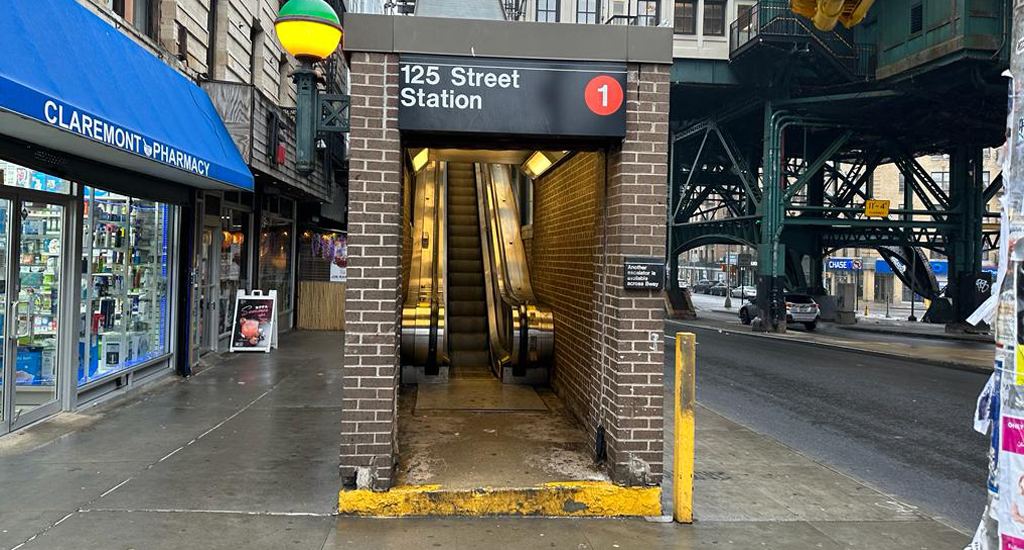The rich get stiffer.
Columbia University refuses to use its massive endowment to pay for full accessibility at the subway station by its upcoming West Harlem expansion, as school officials insist that “public investment” must pay for elevators that will benefit students.
A four year-long tug-of-war between the MTA and the venerable institution over the school’s decision to pay for a wider escalator, but not elevators, at the currently inaccessible elevated 1 train station at 125th Street flies in the face of the Americans with Disabilities Act, according to frustrated politicians and students with disabilities.
“Their decision to not fund [elevators] is not helpful for disabled students or disabled faculty, it’s not taking them into proper consideration because people need it,” said Latif Askia Ba, a 25-year-old wheelchair user, alumnus and lecturer at the university.

In the wintertime, Ba must take an hour-and-a-half Access-A-Ride trip to Columbia University from his Brooklyn apartment — trips that must be pre-scheduled. In warmer seasons, he pilots his power chair 20 blocks from the subway to get to class — because the 96th Street station is the nearest accessible one to the university’s 116th Street main campus.
To be clear, the Ivy League school with the $13-billion endowment and significant tax breaks can legally dodge paying for improvements to the station next its new 34-story residential hall because the city’s “Zoning for Accessibility” law — which required subway-adjacent developers to work with the MTA to build station elevators — was enacted in October 2021, about a year after Columbia’s escalator project was approved.
Planning and design to replace and widen the two street-to-mezzanine escalators on the station’s west side has begun, according to university officials. However, construction timeline remains unclear — work was supposed to be completed later this year after a new residential hall opened above the station, the Columbia Spectator reported in 2022. But work hasn't started yet.
“Under any scenario, I believe that the project was underway before the ZFA was in effect,” Manhattan Borough President Mark Levine told Streetsblog. “But I think they fairly narrowly were able to beat out those new rules.”
Elevator access at the station is “the top priority among station accessibility projects in the borough,” Levine said.
An elevator between the mezzanine and street level will likely cost between $50 million and $100 million, according to Levine. The MTA wants Columbia to fork over more cash for that elevator and to pay for elevators from the mezzanine to the platforms itself. Columbia, meanwhile, insists it’s doing its part by paying for wider escalators at the station — and that someone else should foot the bill for the rest.
“Columbia is committed to replacing and widening the two street-to-mezzanine escalators on the station’s west side,” the university said in a statement, adding that “public investments” should fund “additional enhancements” at the station.
“Additional enhancements are needed to ensure the longer-term safety and accessibility of the 125th Street Station,” the rep said. “That is why we have been working alongside local elected officials, community groups and others to continue advocating for public investments to support these critical upgrades.”
The university promised to release an “independent study of elevator feasibility” at the location, but no such report has materialized.
“The results from the independent study were initially expected to be announced late last year. However, these updates have been pushed back repeatedly, firstly to January of this year and then to February. To this point, Columbia's study results remain unshared with the public,” Mackey Bentley, a spokesperson for Assembly Member Daniel O’Donnell, told Streetsblog. “Persistent postponements and delays do not represent progress, and the university's lack of transparency is disappointing.
“The 125th Street station, despite being frequented daily by both the local community and Columbia affiliates, remains inaccessible,” Bentley added. "As Columbia continues to expand and employ more people on their new campus, it's critical that they also invest in the infrastructure they depend on. Given Columbia's $13-billion endowment and $179 million in annual property tax exemptions, ... Columbia should not be averse to contributing financially and logistically."
Transit officials have been “at the table” pushing Columbia to commit more resources to ADA accessibility at the station, but have made little progress, the MTA said.
“Private entities like Columbia University have a great opportunity to support accessibility in the stations they most directly benefit from and we’ll continue engaging with them to ensure delivery of required accessibility upgrades at 125th Street that meet everyone’s needs,” transportation authority spokesperson Meghan Keegan said in a statement.
The ADA requires stations be made fully accessible in the event of projects like the proposed escalator widening, Keegan said.
Both the university and Council Member Shaun Abreu, one of the signatories, said that progress has been made towards funding full ADA accessibility at the station, but one MTA official who spoke to Streetsblog struck a more dour note.
“We are at the table trying to work with Columbia to make this station accessible for the students and the community,” the official said. "At this time, we haven't had much progress in those conversations.”
Columbia is shirking its responsibility to students and faculty with disabilities, according to Ba and others. Leah Ryan Ten Eyck, a 26-year-old computer science undergraduate student, recalled missing a total of 18 hours of class time last semester solely due to lack of accessibility.
“A lot of times classes are scheduled in the one class in the building that is not wheelchair accessible, it’s up a flight of stairs with no elevator, or my class will be in a building with a wheelchair stairlift that has been broken for months that the university has known about and didn’t fix it until I got stuck,” Ten Eyck said.
"As a student, it hurts my heart and my soul a little bit to hear that my administration, that is supposed to be representing me, is not only not doing that, but is fighting against helping accessibility.”

Some disability groups currently housed within the university are limited by Interschool Governing Board rules that prohibit them from openly advocating against any university misrepresentation. Ten Eyck and Ba hope to use their membership in the non-Columbia-affiliated National Coalition for Disabled Students to join the fight to make the 125th Street station ADA accessible.
O'Donnell has called on Gov. Hochul to including the project in the MTA capital plan and pushed a 500-signature petition urging Columbia to contribute funding.
Hochul’s office declined to comment directly on the letter or accessibility at the 125th Street station beyond providing a list of links to articles about the topic.






